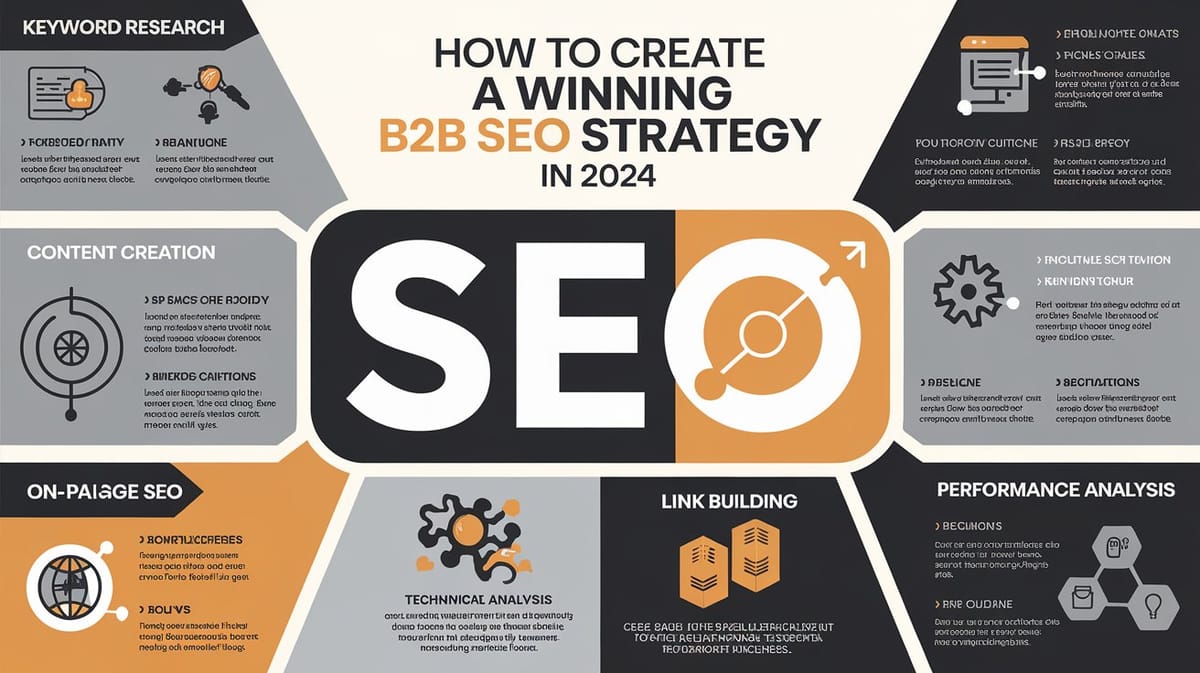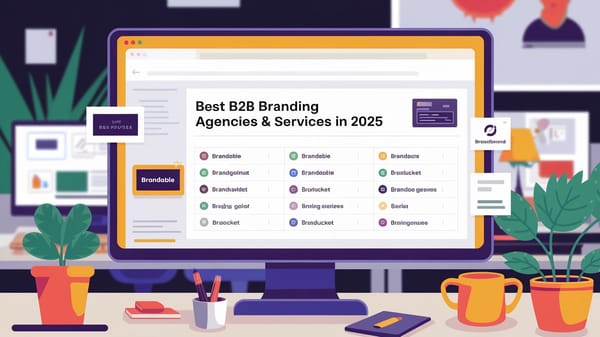How to Create a Winning B2B SEO Strategy in 2024

In the rapidly evolving digital landscape of 2024, creating a robust B2B SEO strategy is more critical than ever for businesses aiming to enhance their online visibility and drive sustainable growth. As search engines continue to refine their algorithms, businesses must adapt to these changes to maintain a competitive edge. This report delves into the essential components of a successful B2B SEO strategy, offering insights into the latest trends, tools, and techniques that can propel your business forward.
The importance of SEO in the B2B sector cannot be overstated. With the increasing reliance on digital channels for business transactions, having a strong online presence is crucial. According to recent studies, over 70% of B2B buyers begin their purchasing journey with a search engine query, underscoring the need for businesses to optimize their websites effectively. By leveraging SEO, companies can not only improve their search engine rankings but also enhance user experience, build brand credibility, and ultimately drive more qualified leads.
In 2024, several key trends are shaping the B2B SEO landscape. The rise of artificial intelligence and machine learning in search algorithms is making it imperative for businesses to focus on creating high-quality, relevant content that meets the needs of their target audience. Additionally, the growing importance of voice search and mobile optimization means that businesses must ensure their websites are accessible and user-friendly across all devices. Furthermore, the increasing emphasis on E-A-T (Expertise, Authoritativeness, Trustworthiness) by search engines highlights the need for businesses to establish themselves as thought leaders in their respective industries.
You can also visit Oncely.com to find more Top Trending AI Tools. Oncely partners with software developers and companies to present exclusive deals on their products. One unique aspect of Oncely is its “Lifetime Access” feature, where customers can purchase a product once and gain ongoing access to it without any recurring fees. Oncely also provides a 60-day money-back guarantee on most purchases, allowing customers to try out the products and services risk-free.
Oncely are hunting for the most fantastic AI & Software lifetime deals like the ones below or their alternatives:

Table of Contents
- Understanding B2B SEO Trends in 2024
- Embracing E-E-A-T Principles
- The Role of AI in Content Creation and Optimization
- The Shift Towards Zero-Click Searches
- Importance of Long-Form, Comprehensive Content
- Leveraging Technical SEO for Enhanced Performance
- Personalization and User Experience
- Conclusion
- Developing a B2B Keyword Strategy
- Understanding the Importance of Keyword Strategy in B2B SEO
- Identifying Bottom-of-the-Funnel Keywords
- Conducting Comprehensive Keyword Research
- Utilizing Long-Tail Keywords
- Aligning Keywords with Search Intent
- Leveraging AI and Data Analytics
- Monitoring and Adapting Keyword Strategy
- Conclusion
- Implementing On-Page and Technical SEO for B2B
- On-Page SEO Techniques for B2B Websites
- Technical SEO Essentials for B2B Sites
- Enhancing User Experience through Technical SEO
- Leveraging Structured Data and Schema Markup
- Monitoring and Adapting SEO Strategies
Understanding B2B SEO Trends in 2024
Embracing E-E-A-T Principles
In 2024, the emphasis on E-E-A-T (Experience, Expertise, Authoritativeness, and Trustworthiness) has become more pronounced in B2B SEO strategies. This framework is crucial for establishing credibility and authority in the digital space, especially for B2B companies where decision-making processes are complex and involve multiple stakeholders. According to UpLead, doubling down on E-E-A-T is essential as search engines like Google continue to prioritize content that demonstrates these qualities. B2B companies are encouraged to showcase their expertise through detailed case studies, white papers, and expert interviews, which not only enhance their E-E-A-T score but also build trust with potential clients.
The Role of AI in Content Creation and Optimization
Artificial Intelligence (AI) is revolutionizing the way B2B companies approach SEO. The integration of AI tools in content creation and optimization processes allows for more efficient and effective strategies. As noted by Forbes, AI tools are increasingly being used to analyze large datasets, predict search trends, and automate repetitive tasks such as keyword research and meta description generation. This technological advancement enables B2B marketers to focus on creating high-quality, relevant content that meets the needs of their target audience. Furthermore, AI-driven insights help in personalizing content, thereby improving user engagement and conversion rates.
The Shift Towards Zero-Click Searches
The introduction of Google's search generative experience, known as "AI overviews," has led to a rise in zero-click searches, where users find answers directly on the search results page without clicking through to a website. This trend, highlighted by TripleDart, necessitates a shift in B2B SEO strategies. Companies must optimize their content to appear in featured snippets and other SERP features to maintain visibility. This involves structuring content to answer common questions succinctly and using schema markup to enhance search engine understanding. By doing so, B2B companies can capture attention and drive brand awareness even when users do not click through to their websites.
Importance of Long-Form, Comprehensive Content
Long-form content continues to be a significant trend in B2B SEO, as it tends to rank higher in search engine results due to its depth and comprehensiveness. According to Overthink Group, comprehensive content that covers topics in detail not only attracts more backlinks from reputable sites but also satisfies search engines' preference for authoritative content. B2B companies are advised to invest in creating in-depth articles, guides, and reports that address the specific needs and pain points of their target audience. This approach not only improves search rankings but also positions the company as a thought leader in its industry.
Leveraging Technical SEO for Enhanced Performance
Technical SEO remains a cornerstone of effective B2B SEO strategies. As search engines become more sophisticated, the technical aspects of a website, such as site speed, mobile-friendliness, and secure connections, play a crucial role in determining search rankings. Backlinko emphasizes the importance of optimizing these elements to ensure a seamless user experience. B2B companies should conduct regular technical audits to identify and fix issues that could hinder their SEO performance. Additionally, implementing structured data and ensuring proper site architecture can enhance search engine crawling and indexing, leading to better visibility and higher rankings.
Personalization and User Experience
In 2024, personalization and user experience are at the forefront of B2B SEO strategies. As noted by Forbes, understanding and serving audience needs through personalized experiences is key to resonating with potential clients. B2B companies are leveraging data analytics to gain insights into user behavior and preferences, allowing them to tailor content and interactions accordingly. This personalized approach not only improves user engagement but also increases the likelihood of conversion. By focusing on delivering relevant and valuable experiences, B2B companies can differentiate themselves in a competitive digital landscape.
Conclusion
The B2B SEO landscape in 2024 is characterized by a focus on E-E-A-T principles, the integration of AI, the rise of zero-click searches, the importance of long-form content, and the emphasis on technical SEO and personalization. By adapting to these trends, B2B companies can enhance their online visibility, build brand authority, and drive targeted traffic to their websites. As the digital marketing environment continues to evolve, staying ahead of these trends will be crucial for success in the B2B sector.
Developing a B2B Keyword Strategy
Understanding the Importance of Keyword Strategy in B2B SEO
In the realm of B2B SEO, developing a robust keyword strategy is pivotal for enhancing search engine visibility and attracting qualified leads. Unlike B2C, where the focus is often on high-volume keywords, B2B SEO requires a more nuanced approach, targeting specific decision-makers and industry-specific terms. This strategy involves identifying keywords that align with the search intent of business buyers, who typically engage in longer sales cycles and require more detailed information before making purchasing decisions (Soone Agency).
Identifying Bottom-of-the-Funnel Keywords
A critical component of a successful B2B keyword strategy is the identification of bottom-of-the-funnel (BOFU) keywords. These keywords are used by potential customers who are close to making a purchase decision. BOFU keywords often include terms like "buy," "compare," "review," and "pricing," which indicate a high level of purchase intent. By targeting these keywords, B2B companies can attract leads that are more likely to convert into customers (Soone Agency).
Conducting Comprehensive Keyword Research
Keyword research in B2B SEO involves a detailed analysis of industry-specific terms and phrases that potential clients use during their research process. This includes leveraging tools like Google Keyword Planner, SEMrush, and Ahrefs to identify keywords with high relevance and search volume. Additionally, understanding the competitive landscape is crucial, as it helps in identifying gaps and opportunities where your content can stand out (RevenueZen).
Utilizing Long-Tail Keywords
Long-tail keywords, which are longer and more specific phrases, play a significant role in B2B SEO. These keywords often have lower search volumes but higher conversion rates because they cater to niche audiences with specific needs. For instance, a company offering cloud-based accounting software might target long-tail keywords like "cloud accounting software for small businesses" or "best cloud accounting solutions for startups." By focusing on these keywords, B2B companies can attract highly targeted traffic that is more likely to convert (Forbes).
Aligning Keywords with Search Intent
Understanding and aligning with search intent is crucial in developing an effective B2B keyword strategy. Search intent can be categorized into informational, navigational, transactional, and commercial investigation. B2B marketers need to ensure that their content matches the intent behind the keywords they are targeting. For example, if the intent is informational, the content should provide detailed insights and solutions to the user's query. Conversely, if the intent is transactional, the content should focus on facilitating a purchase decision (Overthink Group).
Leveraging AI and Data Analytics
The integration of AI and data analytics in keyword strategy development is becoming increasingly important. AI tools can analyze vast amounts of data to identify emerging keyword trends and patterns that might not be immediately apparent. These insights can help B2B marketers refine their keyword strategies to better meet the evolving needs of their target audience. Additionally, AI can assist in predicting future keyword trends, allowing companies to stay ahead of the competition (TopRank Marketing).
Monitoring and Adapting Keyword Strategy
A successful B2B keyword strategy is not static; it requires continuous monitoring and adaptation. Regularly reviewing keyword performance and making necessary adjustments ensures that the strategy remains aligned with changing market dynamics and search engine algorithms. Tools like Google Analytics and Search Console can provide valuable insights into keyword performance, helping marketers identify which keywords are driving traffic and conversions, and which need to be optimized or replaced (Uplead).
Conclusion
Developing a B2B keyword strategy in 2024 involves a comprehensive approach that includes identifying BOFU and long-tail keywords, aligning with search intent, and leveraging AI and data analytics. By continuously monitoring and adapting their strategies, B2B companies can enhance their search engine visibility, attract qualified leads, and ultimately drive business growth.
Implementing On-Page and Technical SEO for B2B
On-Page SEO Techniques for B2B Websites
On-page SEO is crucial for enhancing the visibility of B2B websites in search engine results. It involves optimizing various elements on web pages, including content, HTML, and site architecture. Written content such as blog posts and service pages are particularly beneficial for SEO as they provide opportunities to incorporate keywords and engage with the audience. User experience is a critical factor in on-page optimization, directly impacting how visitors interact with the site and how search engines rank web pages (SalesHive).
Internal linking is another crucial aspect of on-page SEO. It helps search engines understand the relationship between different content ideas and pages, promoting better indexing. Developing topic clusters around pillar pages improves a site’s SEO and ensures that search engines understand the context and relevance of the content (SalesHive).
Optimizing meta descriptions and title tags is essential for on-page SEO. These elements should be infused with long-tail keywords to improve search visibility and click-through rates. Additionally, using relevant anchor text for internal links can optimize landing pages, maximize their effectiveness, and enhance the overall SEO strategy (SalesHive).
Technical SEO Essentials for B2B Sites
Technical SEO focuses on optimizing the structural aspects of a website to aid search engines in crawling and indexing content. This includes ensuring that long-form content on the website is easily navigable and understandable by search engines. A crucial element of technical SEO is site architecture, which involves organizing a website's pages in a logical and hierarchical manner to improve user experience and search engine indexing (SalesHive).
Conducting a technical SEO audit is vital for identifying areas for improvement. This process involves checking for issues such as broken links, duplicate content, and slow page load times. Regular audits help ensure that a website remains optimized for search engines and provides a seamless user experience (SalesHive).
Enhancing User Experience through Technical SEO
Today's search engines favor websites that offer a superior user experience (UX), and technical SEO aims to provide this. By streamlining a website’s technical elements, it enhances performance and reliability, ensuring faster loading times, which keeps users engaged and reduces bounce rates. Secure browsing builds users’ trust, which is critical for search engine rankings (Forbes).
Regularly updating plugins, themes, and other software prevents technical debt that can bog sites down over time. Core web vitals, such as page load speed and interactivity, represent an opportunity to stand out from competitors that neglect site performance. Quick web page loads coupled with seamless interactions signal credibility and value creation (UpLead).
Leveraging Structured Data and Schema Markup
Implementing structured data and schema markup is a powerful technical SEO strategy for B2B websites. These elements help search engines understand the content of a page better, which can lead to enhanced search visibility through rich snippets. Rich snippets provide additional information about a page directly in the search results, which can improve click-through rates (Backlinko).
Schema markup can be used to highlight key information such as product details, reviews, and events. This not only helps search engines but also provides users with valuable information at a glance, enhancing the overall user experience (Backlinko).
Monitoring and Adapting SEO Strategies
Regular performance tracking through tools like Google Search Console is essential for keeping SEO efforts on point. Analyzing key SEO KPIs such as goal conversion rates, bounce rates, and inbound links offers valuable insights into user engagement and content effectiveness. Regularly monitoring these KPIs allows businesses to adjust their SEO strategies and improve overall website performance (SalesHive).
SEO audits and adjustments are necessary to adapt to changes in search engine algorithms. These audits help identify areas for improvement and ensure that a website remains competitive in search engine rankings. By staying ahead of the curve, B2B businesses can maintain a strong online presence and continue to attract qualified leads (SalesHive).
In summary, implementing on-page and technical SEO strategies is crucial for B2B businesses aiming to enhance their search visibility and user experience. By focusing on optimizing content, improving site architecture, and leveraging structured data, businesses can improve their search engine rankings and attract more qualified leads. Regular monitoring and adaptation of SEO strategies ensure that businesses remain competitive in the ever-evolving digital landscape.





